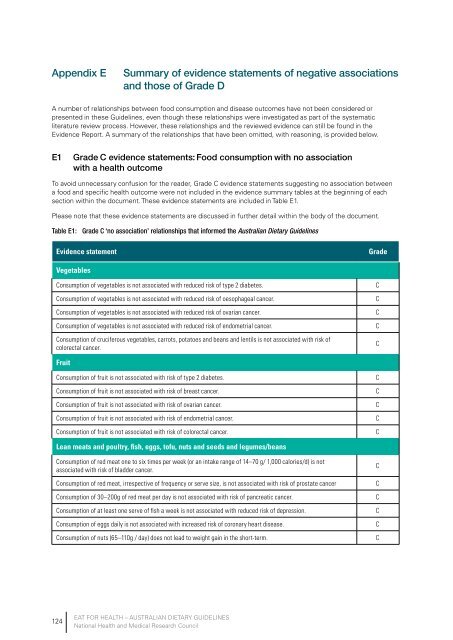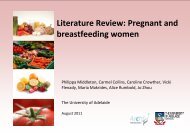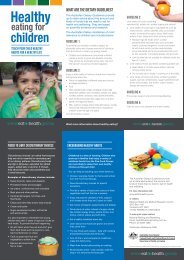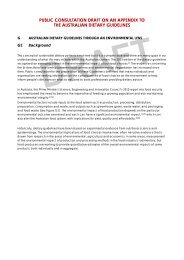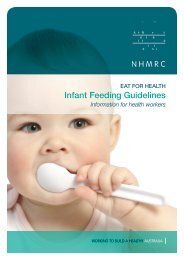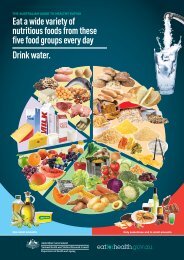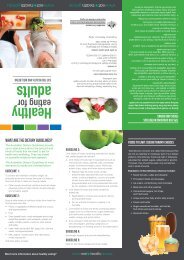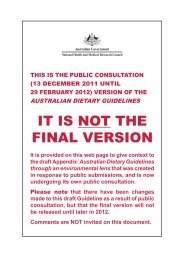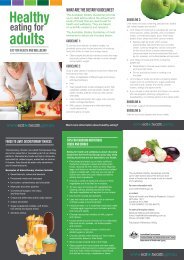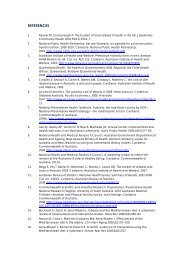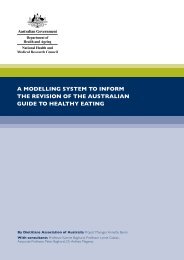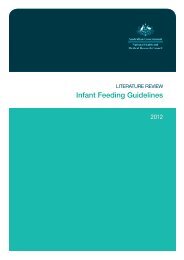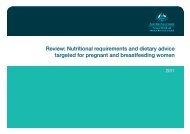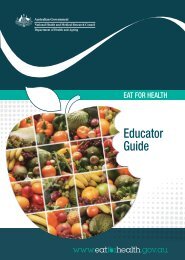Guidelines Dietary - Eat For Health
Guidelines Dietary - Eat For Health
Guidelines Dietary - Eat For Health
- No tags were found...
You also want an ePaper? Increase the reach of your titles
YUMPU automatically turns print PDFs into web optimized ePapers that Google loves.
Appendix ESummary of evidence statements of negative associationsand those of Grade DA number of relationships between food consumption and disease outcomes have not been considered orpresented in these <strong>Guidelines</strong>, even though these relationships were investigated as part of the systematicliterature review process. However, these relationships and the reviewed evidence can still be found in theEvidence Report. A summary of the relationships that have been omitted, with reasoning, is provided below.E1Grade C evidence statements: Food consumption with no associationwith a health outcomeTo avoid unnecessary confusion for the reader, Grade C evidence statements suggesting no association betweena food and specific health outcome were not included in the evidence summary tables at the beginning of eachsection within the document. These evidence statements are included in Table E1.Please note that these evidence statements are discussed in further detail within the body of the document.Table E1: Grade C ‘no association’ relationships that informed the Australian <strong>Dietary</strong> <strong>Guidelines</strong>Evidence statementGradeVegetablesConsumption of vegetables is not associated with reduced risk of type 2 diabetes.Consumption of vegetables is not associated with reduced risk of oesophageal cancer.Consumption of vegetables is not associated with reduced risk of ovarian cancer.Consumption of vegetables is not associated with reduced risk of endometrial cancer.Consumption of cruciferous vegetables, carrots, potatoes and beans and lentils is not associated with risk ofcolorectal cancer.CCCCCFruitConsumption of fruit is not associated with risk of type 2 diabetes.Consumption of fruit is not associated with risk of breast cancer.Consumption of fruit is not associated with risk of ovarian cancer.Consumption of fruit is not associated with risk of endometrial cancer.Consumption of fruit is not associated with risk of colorectal cancer.CCCCCLean meats and poultry, fish, eggs, tofu, nuts and seeds and legumes/beansConsumption of red meat one to six times per week (or an intake range of 14–70 g/ 1,000 calories/d) is notassociated with risk of bladder cancer.Consumption of red meat, irrespective of frequency or serve size, is not associated with risk of prostate cancerConsumption of 30–200g of red meat per day is not associated with risk of pancreatic cancer.Consumption of at least one serve of fish a week is not associated with reduced risk of depression.Consumption of eggs daily is not associated with increased risk of coronary heart disease.Consumption of nuts (65–110g / day) does not lead to weight gain in the short-term.CCCCCC124EAT FOR HEALTH – australian dietary guidelinesNational <strong>Health</strong> and Medical Research Council


